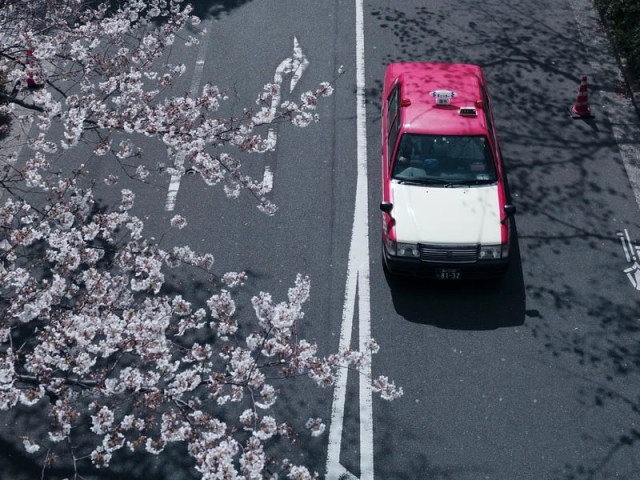
Like many people who moved to Tokyo in their youth, most of the time I’ve spent in Japanese taxi cabs has been directly preceded by heavy drinking. In the country’s urban centers, people primarily get around by train and subway. However, both of them stop running around midnight (for now?), at which time you can see a mass of people stumbling towards the station like Cinderella if she’d spent less time on the dance floor with the prince and more at the ball’s open bar. Once the trains stop, they don’t start again until about five in the morning, and since staying out all night drinking only seems like a good idea until your buzz wears off at around 2:30 a.m., if you missed the last train the only way you’re getting home is by taking a taxi.
Like taking a cab ride anywhere else in the world, the drivers use radios to communicate with the dispatcher and other cars in the fleet. I could never understand what Japanese taxi drivers were saying to each other, but the reason why isn’t because I was liquored up (OK, so it wasn’t only because I was liquored up). It turns out cab drivers in Japan have a whole set of jargon and code words that you won’t find in any textbooks.
1. ao tan
Late at night, typically from 11 p.m. to 5 a.m., it’s standard practice for taxis in Japan to increase the fares they charge by about 20 percent. Taxi drivers, especially in Eastern Japan, use the phrase “ao-tan” to refer to this time period.
2. koji chu/under construction
If a Japanese cabbie tells another, “There’s construction going on at the intersection three blocks ahead,” it’s a warning to watch out for a speed trap there. The phrase aka shingo or “red light” is used the same way.
For actual roadwork, they’ll instead say hon koji, literally “actual construction,” and for drunk driving checkpoints it’s maru sui koji.
3. irrashai/welcome
Although they’re normally not given in Japan, this refers to a tip, with the implication that the customer is welcome in the driver’s car anytime.
4. roku
Used mainly in the Kansai region around Osaka, this also means a tip. Roku is a shortened version of yoroku, the Japanese for extra income.
5. obake/ghost
Passengers who need a ride somewhere very far away. While it’s a happy discovery for the driver, finding one of them is still as surprising as seeing a ghost. “The last fare of my shift was a real obake,” might cabbie might say to another.
6. kuten/empty ride
Accidently running the meter without having a passenger in the car. This usually requires a talk with the dispatcher or manager to straighten things out and keep the driver from having to pay the amount out of his own pocket.
7. san keta/three digits
A short fare with a price less than 1,000 yen (US$10). “All I had today was san ketas” is a common cabbie complaint.
8. tarifu/tariff
This means either the taxi fare display screen or the fare charged.
9. Dai Nippon Teikoku/The Great Japanese Empire
This phrase refers to Yamato Motors, Nihon Kotsu, Teito Motors, and Kokusai Motors, the four largest taxi companies. Yon sha, or the four companies, can be used instead.
10. changara
The oldest or most run-down car in the fleet. As in, “Ah man, I’m stuck in the lousy changara all day.”
11. dempyo/sales slip
A prepaid taxi voucher, or alternatively, a long-distance fare.
12. tempura
Having the maximum number of four passengers, but only driving them somewhere less than 1,000 yen (US$10) away.
The pros and cons of these fares are a point of debate within the taxi industry, with some drivers thinking of them as efficient way to do business, while others do not.
13. doyonami/the Saturday night waves
Biker gangs, which tend to come out in force on Saturday (doyoubi) nights. “Even though it’s a weekday, the doyonami is out tonight.”
14. nagare dama/drifting bullet
Cab drivers expect to be able to find passengers who need to go somewhere far when they make a pick up at a taxi stand, but when they end up with a short fare they’ll say, “I hit a nagare dama.”
15. niju/twenty
A passenger who is a member of the yakuza, or Japanese mafia. Comes from 20 being the sum of eight (in Japanese, ya), nine (ku), and three (za.
16. negi/green onion
A customer complaint. Kyoto’s Kujo district is famous for its green onions, and kujo is also the Japanese word for “complaint.” “I’ve got a pain in the butt negi to deal with,” one cabbie might complain to another.
17. hime/princess
A female passenger, disliked by some drivers because they tend to not be riding to destinations as far away as male passengers.
18. mizuage/the catch
Originally a fishing term, this refers to a driver’s total fares for a shift. “How was your mizuage today?” they might ask each other before heading home.
19. meritto/merit
A distress signal that something like a traffic accident has happened, and the driver needs help dealing with the problem.
20. wakame/seaweed
A drunk passenger, staggering about like seaweed drifting in the ocean. “Last weekend I had so many wakame, I couldn’t take it!” See also: author of this article.
So there you have it, 20 phrases that’ll get you talking like a Japanese cabbie and ready to start your career (assuming, of course, you already have a car and a Japanese driver’s license). In the meantime, remember, driving a taxi is hard work. So keep your negi to a minimum and don’t be a nagare dama, so that your driver’s company can finally afford to replace his changara.
Source: Nanapi
Top image: Pakutaso